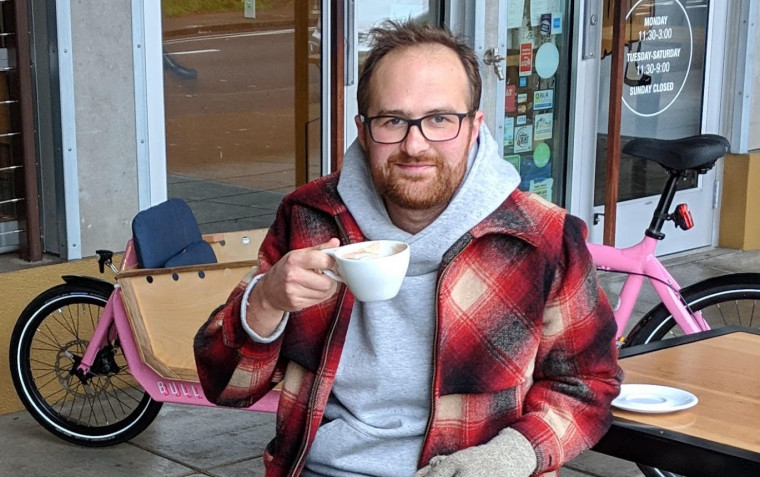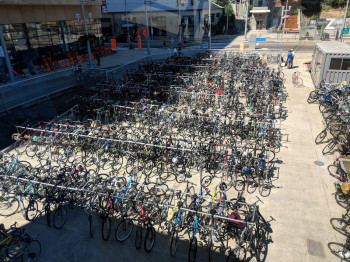Kiel Johnson

Pronouns
Degree and Class Year
Hometown
Major
Minor
Extracurriculars
Job Title, Organization
What three words would you use to describe L&C?
Congratulations on the 10th anniversary of Go By Bike! Can you tell us a little bit about your company?
Go By Bike provides bicycle valet and repairs at the bottom of the aerial tram in Portland, Oregon. In 2007, Portland built an aerial tram to take people from the bottom of the Willamette River to the top of the Oregon Health and Science University (OHSU) Marquam Hill campus. Prior to COVID-19, the tram served about 10,000 riders a day. This is a similar amount of people as some of our busiest roads. We launched in 2012 to provide secure bike parking and repairs to people riding their bike to the tram—the most biked-to destination in North America! On our first day, we had about 40 people park with us. On our busiest day, we had over 450. In 10 years, we have parked and returned over 500,000 bikes. While common in the Netherlands, no one had operated a daily bike valet in the United States until Go By Bike. We can park 450 bikes in the space you could park about 20 cars.

How did Lewis & Clark prepare you to start your own business?
At Lewis & Clark, I focused on learning more about how humans can live in better harmony with the environment. One of the things that struck me the most when I traveled to Europe was how dependent people in the United States are on cars and how we continue to invest massive amounts of money in systems that force us to get around in them. There was a recent New York Times article about whether Portland can meet its climate goals and go forward with our plans to widen our freeways. We cannot.
Life is much better when you can ride a bike somewhere! Going to Lewis & Clark gave me the opportunity to critically think about how our policies impact our lives. After graduating, I wanted to create something that would help us live better lives, and parking bikes sounded like a fun job.
The other day I was eating ramen on the street when someone came over and asked if I started the bike valet. He then thanked me and said that the bike valet allows his family to only have one car. If we aren’t working to make each other’s lives better, then what is the point?
Now that you’ve been out of college for a while, what would you say is the most important thing you learned at Lewis & Clark?
The most important thing I learned is that the future is for us to decide. Just because something does not exist does not mean that it shouldn’t, it just means that someone hasn’t figured it out yet. It is up to all of us to figure out what a better future could look like. In my mind it involves a lot more bike valets and a lot fewer car parking lots. But it is going to take a lot of work to get there.
Were you involved in any sustainability initiatives at L&C? How would you describe sustainability at L&C?
I wrote a sustainability column for the PioLog called “Sustainability is Sexy,” and I also organized an “eco-olympics” where different residence halls competed to reduce their energy use. Having a space for people to think about and try out new ideas is so important for us being able to implement new things. My column allowed me to share ideas and get feedback on them from my peers. Sustainability is a fundamental component of the culture at Lewis & Clark and is one of the reasons I was drawn to the school.
What made you want to come to Lewis & Clark?
I was drawn to the overseas programs, although I got so busy on campus that I never went on one. It is one of my biggest regrets! Although, I did get to do a lot on campus and enjoyed all my time there.
How do you describe the liberal arts?
The liberal arts provide a way to critically look at the world and discover ways to make it a better place. We don’t always get it correct, but it is important to try.
Why did you major in economics?
I majored in economics because it reflects how people in power think about the world. Majoring in economics gives you the ability to better understand so many of the policies and ideas that shape our lives. How we allocate resources is the fundamental question of a society.
What was your favorite class? How did it expand your knowledge?
History of Environmental Thought is a class that I still think about. Associate Professor Andrew Berstein taught it. I took it the first time it was offered and there were only about five of us in the class. We had to read a dense book about environmental history every week and talk about it. From that class, I learned the ways we think about our environment and how they change over time.
Where did you find community on campus?
I found community by meeting my neighbors and sharing common spaces. Why did the United States build so many single-family homes? That design makes us so isolated and lonely, plus it is really expensive and uses a lot more resources. I wish we could all continue to live in environments like a college campus after graduation. We probably could if we didn’t give away so much space to cars.
More Admissions Stories
Admissions is located in Frank Manor House on the Undergraduate Campus.
MSC: 32
email admissions@lclark.edu
voice 503-768-7040
fax 503-768-7055
Vice President of Admissions and Financial Aid
Eric Staab
Admissions
Lewis & Clark
615 S. Palatine Hill Road MSC 32
Portland OR 97219

